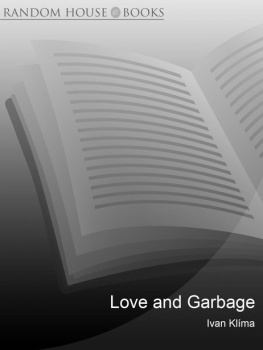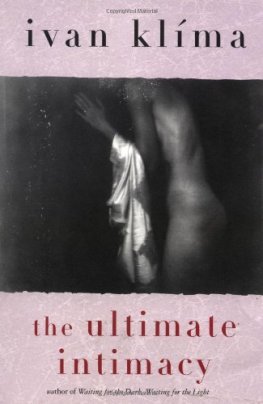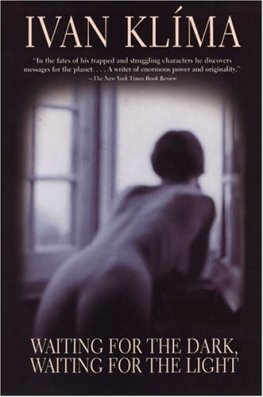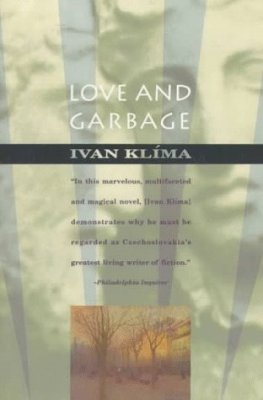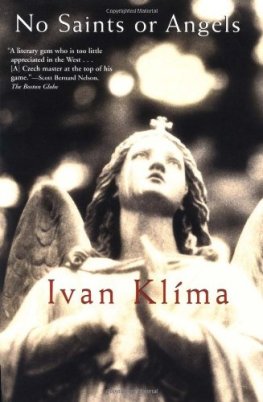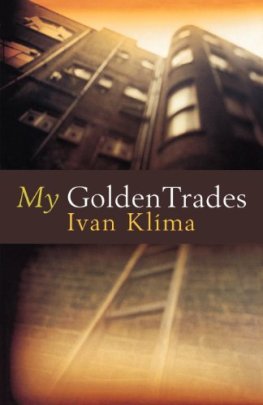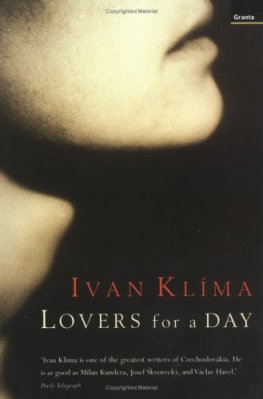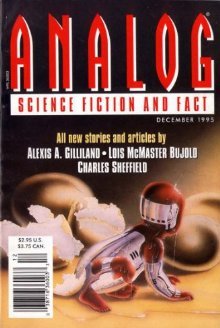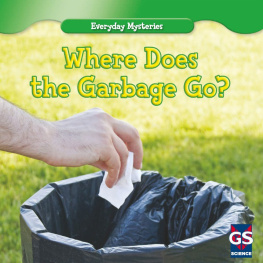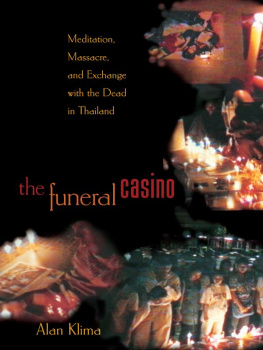About the Author
Ivan Klma was born in 1931 in Prague, where he still lives, and was editor of the journal of the Czech Writers Union during the Prague Spring. He is the author of many plays and novels including Waiting for the Dark, Waiting for the Light, The Ultimate Intimacy, and, most recently, No Saints or Angels.
ALSO BY IVAN KLMA
A Ship Named Hope
My Merry Mornings
My First Loves
A Summer Affair
Judge on Trial
My Golden Trades
The Spirit of Prague
Waiting for the Dark, Waiting for the Light
The Ultimate Intimacy
Lovers for a Day
I
The woman in the office told me to go to the locker room: I was to wait there. So I set out across the court to a door which bore the notice LOCKERS . The office was grey and dismal, and so was the courtyard, with a pile of broken bricks and rubble in one corner, several two-wheeled handcarts, a lot of dustbins, and not a touch of greenery anywhere. The locker room seemed to me even more depressing. I sat down on a seat by the window which looked out on that dismal yard, clutching a small leather case which contained three small sweet buns, a book, and a notebook in which I was in the habit of jotting down anything that occurred to me in connection with what I was writing. Currently I was finishing an essay on Kafka.
There were two other men sitting in the locker room already. One, tall and greying, reminded me of the specialist who many years before had removed my tonsils; the other, a short, stocky man of uncertain age in very dishevelled and dirty trousers scarcely reaching halfway down his calves and with enormous sewn-on pockets rather like misshapen pistol holsters, wore on his head a sea-captains cap with a peak and a gleaming golden anchor above it. From beneath the peak a pair of eyes the colour of shallow coastal waters were watching me curiously. Those eyes, or rather their glance, seemed somehow familiar. He obviously realised that I was new here and advised me to put my identity card on the table. I did as he said, and as he placed his next to mine I noticed that he did not have a right hand; a black hook protruded from his sleeve.
By now my new workmates were beginning to arrive the sweepers. A squat young idiot with a nervous facial tic sat down next to me, took out a pair of dirty shaft-boots from a locker, and turned them upside down. From one of them there ran out a quantity of liquid which might just have, but most probably did not, come from a tap. He immediately began to scream at us all in a language of which I was unable to make out a single word.
I am not sure myself what made me decide to try this unattractive occupation. Most probably I thought that I would gain from it an unexpected view of the world. Every so often you feel that unless you look at the world and at people from a new angle your mind will get blunted.
As I was waiting for what would happen next there suddenly came to my mind the scene, fifteen years ago, when I was about to return home from my stay in America and the dean there gave a dinner in my honour. The dean was a mathematician, and wealthy. He owned a stableful of horses and a house in the style of a hunting lodge. I had only met him once before and I didnt really want to go to the dinner: a crowd of strangers tends to depress me. But then, how could I have known anyone properly when I had been teaching at the university for a mere six months? In the event they all turned out to be pleasant to me and full of smiles as Americans are, and with varying degrees of urgency they asked me to explain what on earth possessed me to want to leave their free and wealthy country to return home, to a poor and unfree country, where theyd probably lock me up or send me to Siberia. I tried to be equally pleasant. I conjured up some kind of patriotism, some kind of mission, until I hit on a convincing explanation. I said that back home people knew me. Even if I had to sweep up garbage in the streets I would be for them what I was, what I wanted to be to the exclusion of anything else, a writer, whereas here, even if I could drive around in my little Ford, I would always be just one of those immigrants on whom a great country had taken pity. These were my boastful words. In reality I wanted to return home, to the place where there were people I was fond of, where I was able to speak fluently, to listen to my native language.
Now I knew that if I was a street-sweeper I would, for the majority of the people, be simply a person who swept the streets, a person hardly noticed.
At that moment a woman appeared in the cloakroom. She had a good figure, with slim hips in tight-fitting jeans. Her face was suntanned and wrinkled like that of the old Indian women I had seen in the market of Santa Fe. One of them, the oldest and most Indian-looking, had, to my great delight, a notice above her stall, revealing that her Christian name was Venus. This Mrs Venus here did not even sit down; from her handbag she produced a packet of Start cigarettes, and as she lit up I noticed that her hands were shaking. The match went out before the cigarette was alight, and Venus swore at it. Her voice was so drink-sodden, deep and hoarse, and her intonation so perfectly matched her appearance, that the leading ladies of the foremost theatres, who often have to play common women, could have taken lessons from her.
Then came a few nondescript elderly men. In the background a short plump man with shrewd features began to change into his working clothes. Like the little idiot next to me he had his own locker. From it he pulled out some khaki overalls.
On the dot of six the woman from the office entered and read out the names of those assigned to cleaning our district of the city that day. First she read out those who were to erect the traffic signs, then the team of three whose job it was to empty the public litter bins. Finally she gave the fat man in the overalls a sheet of paper and announced that the following were detailed for the work party: Zoulov, Pinz, Rada, tych, and finally she read out my name. At the same time she handed me a sweepers orange vest. I accepted it, quickly walked round the table and chose the locker nearest the corner. I opened the door, on which Bui dinh Thi was written in chalk, took my identity papers, buns, book and notebook from my case, stuffed everything into my pockets and closed the locker again.
We all walked out into the depressing yard, where some garbage trucks had arrived noisily and where two young men were flinging shovels, brooms, scrapers, wheelbarrows, traffic signs and battered dustbins onto a pick-up. It was only a quarter past six in the morning, and already I could feel the stifling expanse of the day stretching out before me.
The man in the overalls, whod clearly been assigned to us as our foreman, strode over to the gate and four figures stepped out from the bunch of sweepers, including the only woman, then a youngster with a pale girlish face and a capacious postmans bag over his shoulder, and the man who reminded me of the ear-nose-and-throat specialist. Also the fellow with the captains cap. These people seemed as alien to me as the work which I was about to perform; nevertheless I walked along, just as they did, at a pace which would have been more appropriate to a funeral cortge. With measured tread we strode through the streets of Nusle in our orange uniforms; all around us people were hurrying to work, but we were in no hurry, we were at work already.
This was not a state of mind in which I found myself often: most of my life I had been in a hurry, obsessed by the thought of what I had to accomplish if I wanted to be a good writer. I had wanted to become a writer ever since childhood, and authorship for a long time seemed to me an exalted profession. I believed that a writer should be as wise as a prophet, as pure and rare as a saint, as adroit and fearless as an acrobat on a flying trapeze. Even though I now know that there are no chosen professions, and that what appears to be wisdom, purity, exceptional character, fearlessness and adroitness in one person may seem eccentricity, madness, dullness and uselessness in another, that ancient idea has struck, against my will, in my conscious and subconscious mind, and that is probably why I am afraid to describe myself by the term writer. When I am asked what I do I try to avoid an answer. Besides, who dare say of himself that he is a writer? At best he can say: Ive written some books. Now and again I even think that I am unable to define clearly what the subject of my work is, or what distinguishes real literature from mere writing, the kind that anyone is capable of, even if he never went to school to learn his letters.


